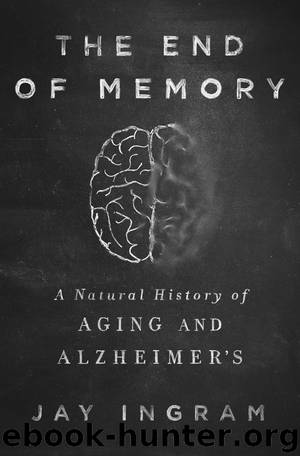The End of Memory by Jay Ingram

Author:Jay Ingram
Language: eng
Format: mobi, epub
ISBN: 9781466887916
Publisher: St. Martin's Press
Published: 2015-10-06T07:44:26+00:00
CHAPTER TWELVE
Is the Epidemic Slowing?
Extreme caution is the only sensible approach to this new development, but some little-publicized reports are beginning to emerge, suggesting that in some countries and with certain patient groups, Alzheimer’s disease, or more broadly, dementia, is declining. Not rising in epidemic fashion. Not showing signs of being the “plague of the twenty-first century” as I called it in the introduction to this book. Slowing instead.
Obviously, if these few studies actually represent a solid trend, demonstrating significant change, it’s a hugely important finding.
The most striking investigation showing the decline of dementia was described in an article in the medical journal the Lancet in 2013 undertaken as a response to demands to know more about the future of dementia.1 If the costs of caregiving were going to soar, everyone from caregivers to ministries of health to pharmaceutical companies needed to know. The authors of this study felt that there was a shortage of studies indicating what the future prevalence of dementia might be, especially among various age groups. They admit they weren’t the first but suggest that earlier studies (which I’ll mention in a moment) were rather hard to interpret and difficult to pull together because of methodological differences like inconsistencies in sampling and diagnosis and disparities in health care available to the participants. In their view, it was impossible to draw firm conclusions from those studies.
Between 1989 and 1994, researchers interviewed and tested sixty-five-year-olds in six different areas in the U.K., using for the most part identical survey methods. They then chose three of those areas—Cambridgeshire, Newcastle and Nottingham—to repeat the survey in 2008 to 2011. So there were two different groups of sixty-five-year-olds, sampled twenty years apart. In each case, roughly 7,700 people were surveyed. When the numbers in the earlier sample were extrapolated to the general population, the number of people with dementia was estimated to be 664,000. Simply taking into account the aging of that population, the group estimated that the 2008–2011 survey would net some 884,000. But no. Instead, the number, 670,000, was roughly the same as twenty years earlier—214,000 less than expected.
It’s important to note that this was dementia, not specifically Alzheimer’s disease, but more about this point shortly. In addition, the research team was quick to identify a set of potential shortcomings, including (for reasons that weren’t clear) a much greater reluctance to take part in the second round of the survey. An 80 per cent response rate in the first round declined to 56 per cent, and it was difficult to know what might therefore have been missing in that data. Why were people refusing to respond, and how would their noninvolvement skew the results? It was even difficult to decide what qualified as dementia in the midst of ongoing controversy over exactly what constitutes an accurate diagnosis.
As I mentioned earlier, this study followed several others that reached similar conclusions, although they were conducted in different ways. An American review of people enrolled in the National Long Term Care Survey (NLTCS) found a significant decline from 1982 to 1999: 5.
Download
This site does not store any files on its server. We only index and link to content provided by other sites. Please contact the content providers to delete copyright contents if any and email us, we'll remove relevant links or contents immediately.
| Administration & Medicine Economics | Allied Health Professions |
| Basic Sciences | Dentistry |
| History | Medical Informatics |
| Medicine | Nursing |
| Pharmacology | Psychology |
| Research | Veterinary Medicine |
Periodization Training for Sports by Tudor Bompa(8273)
Why We Sleep: Unlocking the Power of Sleep and Dreams by Matthew Walker(6725)
Paper Towns by Green John(5191)
The Immortal Life of Henrietta Lacks by Rebecca Skloot(4588)
The Sports Rules Book by Human Kinetics(4388)
Dynamic Alignment Through Imagery by Eric Franklin(4217)
ACSM's Complete Guide to Fitness & Health by ACSM(4060)
Kaplan MCAT Organic Chemistry Review: Created for MCAT 2015 (Kaplan Test Prep) by Kaplan(4012)
Livewired by David Eagleman(3775)
Introduction to Kinesiology by Shirl J. Hoffman(3773)
The Death of the Heart by Elizabeth Bowen(3622)
The River of Consciousness by Oliver Sacks(3604)
Alchemy and Alchemists by C. J. S. Thompson(3522)
Bad Pharma by Ben Goldacre(3428)
Descartes' Error by Antonio Damasio(3279)
The Emperor of All Maladies: A Biography of Cancer by Siddhartha Mukherjee(3163)
The Gene: An Intimate History by Siddhartha Mukherjee(3098)
The Fate of Rome: Climate, Disease, and the End of an Empire (The Princeton History of the Ancient World) by Kyle Harper(3067)
Kaplan MCAT Behavioral Sciences Review: Created for MCAT 2015 (Kaplan Test Prep) by Kaplan(2986)
